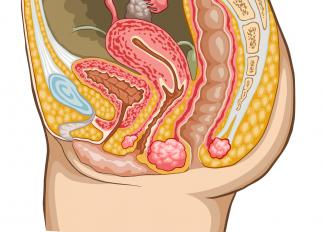
With inputs from Dr. Chandan Dubey
What is it
If you have 2 or more of the following symptoms, you should get yourself checked by a gynaecologist to confirm or rule out Polycystic Ovarian Syndrome (PCOS):
• Multiple small cysts in the ovaries
• Infrequent (more than 35 days) or absent periods due to eggs not releasing every month
• High androgen features (facial and body hair, acne, abdominal fat, frontal balding)
PCOS and its impact
PCOS may lead to acne, excessive hair growth, weight gain and problems with ovulation. The patient may have high blood pressure and deranged lipid levels, which can lead to health problems in the future.
Women with PCOS are at risk of diabetes in later life especially if they are obese, with a family history – so they need to check their blood sugar – Fasting Blood Glucose (FBG) or Oral Glucose Tolerance Test (OGTT).
What causes PCOS
Exact cause of PCOS is not known. It may be caused by insulin resistance (also a causative factor for Type 2 diabetes), which causes ovarian dysfunction and inability of ovaries to release egg regularly.
Genetic links have also been proposed.
Are you at risk?
Do you have:
- Cycles longer than 35 days (oligomenorroea) or no periods at all (amenorrhoea - primary or secondary).
- Overweight (BMI >25 kg/m2)
- Central obesity or increased abdominal girth
- Family history of PCOS
- Acne
- Type 2 diabetes and/or infertility
- Female relative with hirsutism or infertility
- Hyperinsulinemia (increase in insulin hormone level in the body)
You may also have:
- Alopecia (frontal balding)
- Hypercholesterolemia
- Hypertension
- Elevated triglycerides
- History of difficulty in ovulation (ovulatory dysfunction)
- Increase in androgen hormone levels – (Hyperandrogenism)
- Total testosterone >50 ug/dl (normal female <2.5 ng/dl) would need to rule out ovarian or adrenal tumour
- Decrease in thyroid hormone level (Hypothyroidism)
Can PCOS be prevented
You can control the symptoms by keeping weight under control through diet and exercise. That is the best preventive measure.
Symptoms
- Multiple cysts
- Infrequent (more than 35 days) or absent periods due to eggs not releasing every month
- High androgen features (facial and body hair, acne, abdominal fat, frontal balding)
What kind of screening tests should I have
Your gynaecologist will recommend tests based on your condition. You will have to:
- Get PCOS confirmed or ruled out if you have the symptoms mentioned.
- Have an annual FBG or OGTT test for those suspected of diabetes
- Have an annual gynaecology check-up
Treatment
The doctor may recommend the following:
For lean without hyperinsulinemia
- Low androgen activity oral contraceptive pills (OCP)
For obese and/or hyperinsulinemia or dyslipidemia treating with weight reduction
- Drugs such as Metformin then OCP with low androgen activity therapy
- Ovulation drugs may be recommended
- Family planning and psychological support are essential components.
Follow-up care : The doctor may recommend the following check-ups:
- Menstrual calendar should be tracked
- If you are a diabetic, all the related check-ups as mentioned in the diabetes overview
- Preconceptual planning
- Psychological support
- Depression screening
















